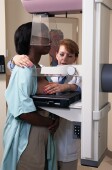
TUESDAY, Oct. 12 (HealthDay News) — The so-called racial gap in breast cancer care has long been known by researchers, with black and Hispanic women less likely to get recommended breast cancer treatments than white patients.
“Less well known is what the issue is — is it race itself or something else contributing?” said Dr. Rachel Freedman, a medical oncologist at Dana Farber Cancer Institute in Boston, and an instructor in medicine at Harvard Medical School.
Her team’s new study suggests that financial factors such as economic and social class or access to insurance alone can’t explain the “gap”: Even after accounting for those differences, racial disparities in breast cancer care still showed up.
The study, published online Oct. 11 in the journal Cancer, “was unique because it included adult women of all ages, and included [those with] insurance,” Freedman said.
Freedman evaluated information on more than 662,000 white, black and Hispanic women diagnosed with invasive breast cancer from 1998 to 2005. She used data from the U.S. National Cancer Data Base, a registry that collects information on patients’ treatments, outcomes, insurance and socioeconomic status.
In the database, 86 percent of the women were white, 10 percent black, and 4 percent Hispanic.
When they evaluated whether women got the correct treatments and testing, the team found no differences by race/ethnicity for hormone receptor testing (evaluating whether a cancer is estrogen-receptor positive or negative, which could help guide treatment).
But they did find differences in other interventions. For example, black women had lower odds of getting recommended treatments — interventions such as mastectomy or breast-conserving therapy, chemotherapy and hormone therapy (such as aromatase inhibitor drugs to reduce recurrence risk), Freedman said. And Hispanic women were less likely than white women to get hormonal therapy.
Freedman found black women 9 percent less likely than white women to get mastectomy, breast-conserving surgery or other treatments, 10 percent less likely to get hormonal therapy and 13 percent less likely to get chemotherapy.
Importantly, these disparities persisted even after the researchers accounted for insurance coverage and socioeconomic status. “In this study, even with those with the same insurance, there were race gaps,” Freedman said.
“Further investigation is needed,” she said, “to figure out which [other] factors are meaningful.”
Freedman said the study does have limitations, including her finding of relatively modest absolute differences in the care different types of patients received. Even so, because breast cancer is so often diagnosed, these small discrepancies would end up affecting large numbers of women, she said.
While the database was large, the information was not always complete. Information was missing on many women. For instance, more than 46,000 women were excluded from the chemotherapy analysis, because data was missing.
One expert agreed that a gap in care linked to race does seem to persist.
Despite the study’s limitations, “it does look like there still are racial differences, but tempered somewhat by insurance and socioeconomic status,” said Dr. Nina Bickell, associate professor of healthy policy and medicine, Mount Sinai School of Medicine in New York City.
But for women of any race diagnosed with breast cancer, the message is the same, said Bickell. “I would tell anybody they should be getting information, and there’s lots of excellent information available to those with breast cancer.”
“Get it from credible sources,” she said, such as the American Cancer Society.
She also recommends that women diagnosed with breast cancer write a list of questions before they go in for a doctor visit, take a friend or family member with them to help them understand options, and consider taking a tape recorder so information can be replayed later.
More information
To find out more about race-linked discrepancies in cancer care, head to standuptocancer.org.

